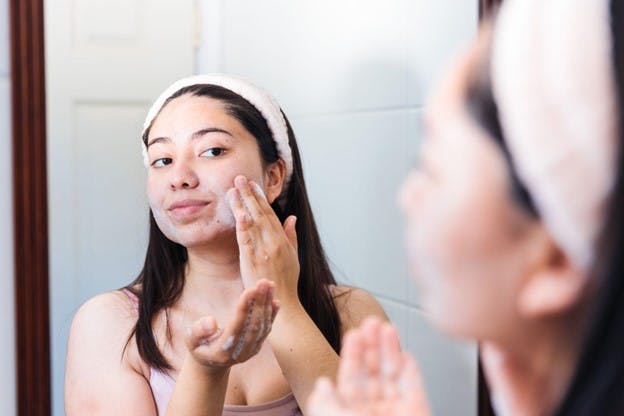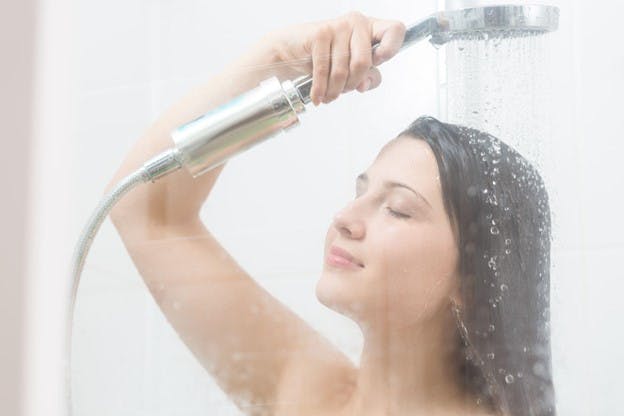🌟 New Arrival! Upgrade Your Water with Our Advanced Pitcher Filter. Shop Now
August 2023
The Benefits of Using a Water Filter in Bathroom
It seems like almost everyone is drinking more water these days. It’s healthy, easily accessible, and it’s refreshing. Unfortunately, what comes out of your faucet isn’t always as pure as we’d like it to be. Tap water can have a funny taste and may even contain dangerous contaminants. It makes a lot of sense that water filters are becoming more popular each year.
Everyone would love to have a whole home water filtration system, but for those who aren’t homeowners or who live in an apartment, this isn’t always an option. In that case, point-of-use water filters at the kitchen sink are a popular second choice. But what about the bathroom?
While most people aren’t drinking a lot of water from their bathroom sinks, a lot of people wonder if they’d be better off showering or brushing their teeth with purified water. In this article, we’re going to take a deep dive into the reasons you may or may not want a water filter in your bathroom. We’ll also give you some of the best options if you decide you do.
What’s In Your Bathroom Water?
In the United States, roughly 51% of all bodies of water are impaired, according to Environmental Integrity Project (EIP), a nonpartisan nonprofit. This means they are too polluted for things like swimming or fishing. Unfortunately, a lot of our drinking water comes from these impaired water bodies. After it’s pulled up and chemically treated, the water is then sent through aging pipe networks that are about 45 years old on average. While we still consider this water safe to drink once it's treated, it’s clear that there’s a lot of room for improvement.
More and more we’re seeing headlines about water contaminants like heavy metals, sediment, PFAS, microplastics, disinfection byproducts, VOCs, pesticides, hard water minerals, and chromium. This doesn’t include the chlorine, chloramines, and fluoride added by the utilities during water treatment.
While there is some research out there about these contaminants, we don’t know a whole lot about many of them yet. For instance, there’s evidence to suggest that hard water minerals like calcium and magnesium may trigger eczema outbreaks and acne but the research is still very young.
Why Is Bathroom Water Quality Important?
Water isn’t just for drinking and cooking with. Water is also the cornerstone of your hygiene, and the bathroom is where most of your daily hygiene ritual takes place. The quality of water coming out of the showerhead can play a big role in the health of your hair and skin.
Hard water is a common issue in many households. While hard water isn't considered harmful to ingest, its effects on your skin and hair can be less than desirable. High mineral content can leave your skin feeling dry and itchy. It can cause a buildup on your hair, making it appear dull, rough, and weighed down.
Furthermore, chlorine and chloramines, routinely added to water as a disinfectant, may also pose concerns. While they’re great for eliminating harmful bacteria, prolonged exposure to chlorinated water can further strip your skin of its natural oils, leading to dryness and irritation.
They also leave harmful disinfection byproducts (DPBs) like trihalomethanes in your water. Disinfection byproducts form when chlorine and chloramines interact with organic matter. Unlike chlorine, which will dry your skin and hair but isn’t dangerous to ingest at low concentrations, DPBs can cause a variety of health problems. It can even increase your risk of certain cancers. And DPBs can be absorbed through your skin.
PFOA (a chemical that used to be used in Teflon), atrazine (an herbicide), and many more are also in most tap water. They’re easily absorbed through skin. PFOAs are now so common in the U.S. water supply that the Environmental Protection Agency is looking to add them to the list of regulated substances in drinking water. This would be the first new chemical added to the list in 20 years.
Beyond your personal health, poor water quality can also hurt the aesthetic appeal and function of your bathroom fixtures. Hard water can cause limescale buildup around taps and showerheads, which can be a nuisance to clean and can also attract bacteria.
What Are the Advantages of a Water Filter in a Bathroom?
Using a whole house filter that covers your entire water supply or using a dedicated water filter in your bathroom can have many advantages. Here are the four that will make a noticeable difference.
Bathroom Water Filters Improve Your Skin and Hair
Americans have never spent more time or money on appearance. And a good deal of it is spent on hair and skin. In 2022, individuals put $722 on average into looking better. But it should come as no surprise that showering in chemical-filled water isn’t doing your hair or skin any favors. In fact, many people report improvements in skin and hair after just weeks of using a high-quality water filter.
Prolongs the Life of Your Bathroom Fixtures
Hard water and heavy metals can decrease the lifespan of your fixtures and plumbing. They also tend to stain sinks, tubs, toilets, and tiles and leave a hard-to-clean crust on your beautiful bathroom fixtures.
A water softener and a water filter in your bathroom can protect your plumbing, surfaces, and fixtures, increasing their lifespan and saving you a bunch of money on replacements and repairs.
Saves You Money on Soap, Moisturizer, and Other Skin Care Products
Did you know that hard water minerals like calcium and magnesium actually cause you to use more soap than you really need? The minerals combine with the soap to create soap scum that sticks to your skin and dries it out. The same can be said for shampoo and even the cleaners you use on your bathroom surfaces.
The drying effects that soap scum, chlorine, and hard water minerals have on skin mean you probably feel inclined to use more moisturizer as well.
Unfiltered water can also increase acne breakouts and eczema flare-ups, causing you to reach for more products to treat your sensitive skin.
Gives You Peace of Mind
While maybe not as measurable as the others, this may be the most important. There are over 160 million chemicals known to humans. The EPA puts enforceable limits on just 90 of them. Some say the limits they do enforce are too high to be protective of our health.
Some impurities, like microplastics, are found in water supplies across the world but aren’t even tested for by public water utilities. If you have a private well, your water has no public protections at all. It’s the sole responsibility of the well owner to keep the well water clean and safe.
Water filters in your bathroom and kitchen remove many different impurities from your water. Using a high-quality water filtration system gives you peace of mind that your water is as clean as possible.
3 Types of Water Filters for Your Bathroom
There are several options when it comes to water filters in your bathroom. Here are a few of the most popular.
Whole House Water Filter System
If you own your home, a whole house water filter system should definitely be considered. Known as point-of-entry systems, water has to go through this filtration system as it enters your home’s plumbing from your well or service line. That means the water that goes to your kitchen sink, dishwasher, laundry, shower, toilets, and outdoor spigot is all going to be filtered. You can even add a water softener to remove hard water minerals.
These are not right for everyone. If you live in an apartment or don’t own your home, you may not be allowed to install one of these. Also, in the event you are worried about lead in your plumbing, these might not be the best since the filtration would happen before it gets to your pipes.
Shower Water Filter
Shower filters are usually inexpensive and they’re easy to install and maintain. Just be sure you get one that doesn’t rob you of your water pressure.
Our American-made HomeWater Rainshower Restore Shower Filter removes chlorine from your water with easily replaceable cartridges that treat 10,000 gallons of water. The filter has an impressive flow rate of 2 gallons per minute (GPM).
You’ll notice an immediate difference in the quality of your showers and the feel of your hair when you use a high-quality shower head filter.
Under Sink Water Filters
Under sink water filters purify water just before it hits your faucet. These filters usually put water through multiple stages of filtration using some combination of sediment filter, activated carbon, KDF, and reverse osmosis.
Under sink water filters are very popular in kitchens but are often forgotten about when it comes to the bathroom sink.
We recommend the HomeWater EZChange 2-Stage Under Sink Water Filter. It easily removes chlorine, lead, rust, dirt, and particulate matter. It also improves taste and odor. You’ll find it easy to install with a small footprint that’s perfect for a bathroom. You won’t have to alter your countertop at all, since it runs inline with your current faucet.
Do You Need a Water Filter in Your Bathroom?
Using a high-quality water filter in your bathroom protects your skin, hair, plumbing, and fixtures from damaging chemicals and minerals. Whether that’s in the form of a whole house filter with a water softener or a dedicated showerhead and under sink filter, you’ll notice an immediate difference in how you look and feel when you improve your water quality.
If you want the cleanest and best-tasting water to drink, brush your teeth with, and bathe in, HomeWater can help. Our UPSTREAM™ 4-Stage Whole Home Water Filter will protect every faucet and appliance in your home. Its unique blend of red flint, KDF55, and catalytic carbon delivers superior filter performance. It filters particulates, heavy metals, chlorine, VOCs, PFOS/PFAS, and more. Add on a salt-free water conditioner to make your hard water problems a thing of the past.
Or if you’re not sure which water filter is right for you, take our quick and easy Filter Quiz! You’re just a few minutes away from finding the best water solution for your home and bathroom.


